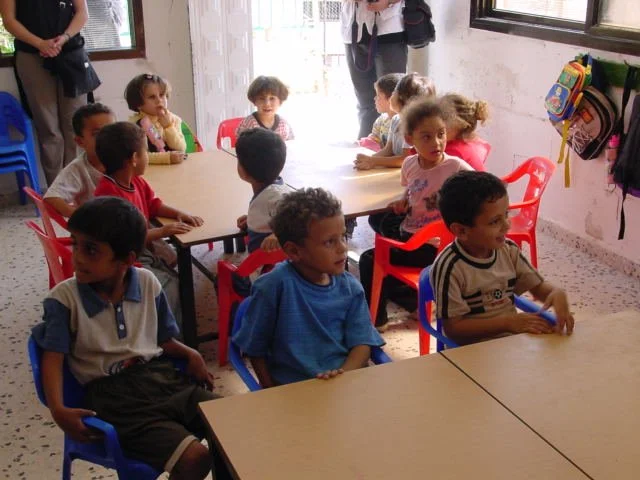October 22, 2003
The arduous “roads” that Palestinians are forced to take in the West Bank.
This morning Marthame took the group to Jenin Camp through the "roads" that cut through the olive groves. From hour to hour, one never knows which way will be open - if any - so we were glad to find one. A taste of daily Palestinian life.
Kindergarten students at Roots Youth Center in Jenin Camp.
Our guides around the Camp were three young men who volunteer with an organization called Roots Youth Center. Among their many projects are an at-cost kindergarten. It is refreshing to see a real grassroots organization coming from within the community and trying to get at the roots of local problems. I
A sculpture made from the rubble of Jenin Camp, a sign of perserverance and beauty.
n the Camp, we were met at its entrance by a sculpture of a horse that a German artist and Camp youth made out of destroyed cars from the Jenin Camp rubble, including very clearly parts of an ambulance. Our guides took us to the top of the hill which overlooks the center of destruction. "Imagine you are standing on the Mount of Olives overlooking the Old City of Jerusalem. That's how crowded this was before it was all destroyed." Some construction has begun, but most of the people left homeless during the April 2002 incursion are still living and renting outside of the Camp.
The Jenin Camp Martyrs Cemetery.
We also stopped at the "Martyrs' Cemetery" where we were met by an old man tending the flowers on the graves. The grave stones are laid end to end, because very few intact bodies were found. Thus, a stray hand and a random foot and the odd skull were thrown into a mass grave together. We asked the old man for his story. "The Israelis invaded on April 4th. Who lived, lived, and who died, died. What else can I say after I've lost my son and nephew?"
“What happened?” We inquired.
"We were hungry, not allowed outside, so they went out to get food. The Israelis shot them on sight."
“So what's the solution?”
"The solution is with God. He can reconcile us. We need to live in peace. I've lost my son, and a Jewish man loses his son. What has been gained? The solution is with God and God alone."
We moved on from there, fed by simple, profound, graveside philosophy.
Once back in Zababdeh, we visited the Arab American University which has been an important part of life in Zababdeh over the last three years, meeting with some of the ex-pats there before a full supper at the Latin convent, prepared by the Rosary Sisters.
Once the visitors were safely packed off to their hosts' homes, we headed up to the University to let off a little steam in a music jam. This session's gem: "Turn on the TV; you won't believe the things you'll see."




